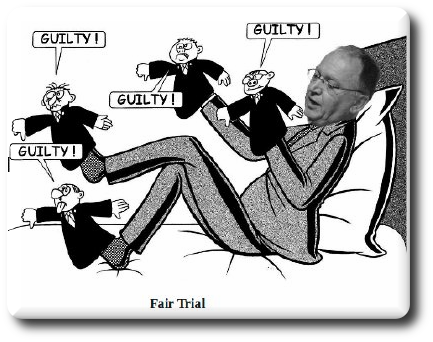

THE staff representatives of the EPO have plenty to worry about because ILO and the AC remain in Battistelli's pocket and he seems capable of doing whatever he wants without any consequences.
AC Disciplinary Case [D1/15] settled?
In its Communiqué of 19 December 2017, the Administrative Council announced that “it took a final decision in a disciplinary case [D1/15] against an employee appointed by the Council - a case which had attracted significant public attention.” and for which the ILO Administrative Tribunal already delivered Judgments 3958 and 3960 ordering the immediate reinstatement of the suspended member of the Boards of Appeal (BoA), whom the Council then declined to re-appoint. The employee was first reinstated in the BoA in Munich for a few days.
In January 2018, the Office informed him that he will be permanently transferred in February 2018 to a post of Senior Expert in Classification expressly created for him in The Hague, pursuant to Art. 41(3) ServRegs.
However, the employee never performed classification work and is instead specialised in substantive examination and legal matters. The assignment to completely new duties is clearly against the interests of the service and betrays the aim of the Office Administration: impose a further covert disciplinary sanction and ultimately engineer a situation of "constructive dismissal" for professional incompetence under Art. 52 ServRegs.
This decision will reopen the discussion on a case meant to be settled.
In its Communiqué, the Council “underlined its expectation that now - after a long period of intense debate - legal peace would be restored.” The ball is now again with the AC if it wants it to be fulfilled.
The letter to the Heads of Delegations of the Administrative Council can be found here.
Your Central Staff Committee
Heads of Delegations of the Administrative Council
Open letter
Forced transfer of a former judge from Munich to The Hague
Dear Heads of Delegations,
In its Communiqué1 of 19 December 2017, the Administrative Council announced that “it took a final decision in a disciplinary case [D1/15] against an employee appointed by the Council - a case which had attracted significant public attention.” and for which the ILO Administrative Tribunal already delivered Judgments 39582 and 39603 ordering the immediate reinstatement of the suspended member of the Boards of Appeal (BoA), whom the Council then declined to re-appoint. The employee was first reinstated in the BoA in Munich for a few days.
In January 2018, the Office informed him that he will be permanently transferred in February 2018 to a post of Senior Expert in Classification expressly created for him in The Hague, pursuant to Art. 41(3) ServRegs. This decision will reopen the discussion on a case meant to be settled:
● First, the Tribunal clearly acknowledged the moral prejudice caused to the employee since December 2014. Transferring him to a country in which he had never lived is a further burden for him and his family. The Office did not fulfil its duty of care by assessing medically whether the employee was fit for a transfer. For medical or personal reasons, the employee may have to refuse to be transferred and in such case the President may decide to terminate his service (Art. 53(1)(b) ServRegs).
________ 1 https://www.epo.org/about-us/governance/communiques.html#a36 2 http://www.ilo.org/dyn/triblex/triblexmain.fullText?p_lang=en&p_judgment_no=3958 3 http://www.ilo.org/dyn/triblex/triblexmain.fullText?p_lang=en&p_judgment_no=3960
● Second, the employee never performed classification work and is instead specialised in substantive examination and legal matters. The assignment to completely new duties is clearly against the interests of the service and betrays the aim of the Office Administration: impose a further covert disciplinary sanction and ultimately engineer a situation of "constructive dismissal" for professional incompetence under Art. 52 ServRegs.
France Telecom, a company formerly including civil servants with lifetime job guarantees in its workforce, organized involuntary transfers of employees in order to pressure them to leave. At the same time the number of suicides increased drastically. Since then, such practices are considered4 to be “particularly disruptive”.
The decision of the Office Administration will also have consequences in pending national proceedings before the German Constitutional Court (Bundesverfassunsgericht), which concern the standing and independence of the BoA. The Court will pay particular attention to the treatment of a former member of the BoA under the authority of a President who was already found by the Tribunal to have a conflict of interest in the matter.
More generally, interested circles will also note how easily the EPO Service Regulations can be misused to (try to) get rid of colleagues, who are supposed to be “permanent employees”, in times where the President of the Office is about to submit to the Council CA/121/175 , a proposal for “modernisation” of the employment framework making the exercise even easier.
In its Communiqué, the Council “underlined its expectation that now - after a long period of intense debate - legal peace would be restored.” The ball is now again with the AC if it wants it to be fulfilled.
Sincerely yours,
Chairman of the Central Staff Committee cc: Mr B. Battistelli, President of the EPO ________ 4 http://www.nytimes.com/2010/04/10/business/global/10ftel.html 5 http://www.epo.org/modules/epoweb/acdocument/epoweb2/304/en/CA-121-17_en.pdf